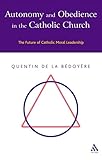Autonomy and Obedience in the Catholic Church The Future of Catholic Moral Leadership
Material type: TextPublication details: New York T and T Clark 2002Description: 165pISBN:
TextPublication details: New York T and T Clark 2002Description: 165pISBN: - 0567088529
- C27.4 B391
| Item type | Current library | Call number | Status | Date due | Barcode | |
|---|---|---|---|---|---|---|
 Books
Books
|
DVK Library Stack -> First Floor -> C | C27.4 B391 (Browse shelf(Opens below)) | Available | 11046480 |
includes index and biblioraphy
The Troubled Church 9 The statistics of decline and some possible explanations, The role of authority as a key issue. The Sovereignty of Conscience 19 Autonomy and truth. The three elements of conscience. Jniversality of natural law. Fundamentalism. The Integration of Love and Law 31 Morality based on law or on love - advantages and disadvantages. How love and law are complementary when rightly understood. Becoming What We Ought to Be 41 The formation of self as a necessary basis for the moral life. A brief look at the acknowledged virtues and a review of novel virtues related to conscience formation. Fallible and Infallible 65 The radical difference. Our primary obligation to the truth and to using the best means to find it. The requirement of virtuous dissent. Christian scepticism. The Process of Conscience Formation 87 A review of conscience formation based on the model of marriage counselling. The `holistic`conscience and the supremacy of reason. The need to teach conscience formation. 7 The Church and Modern Management A `management consultant` reviews authority and leadership in the Church. The difference between essential structure and its practical exercise. The secular and ecclesiastical principle of subsidiarity. True communion and communication. The `tight-loose`principle applied to the Church. Some searching questions. 8 The Communion of the Church The Church as a communion of love. The paradigm of marriage. The advantages of leadership authority in the Church over compulsive authority. The true mark of the Church.
There are no comments on this title.
